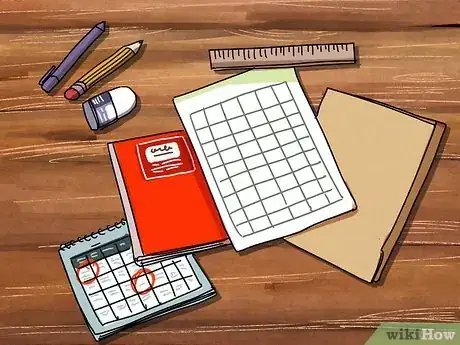This article was co-authored by Katie Styzek. Katie Styzek is a Professional School Counselor for Chicago Public Schools. Katie earned a BS in Elementary Education with a Concentration in Mathematics from the University of Illinois at Urbana-Champaign. She served as a middle school mathematics, science, and social studies teacher for three years prior to becoming a counselor. She holds a Master of Education (M.Ed.) in School Counseling from DePaul University and an MA in Educational Leadership from Northeastern Illinois University. Katie holds an Illinois School Counselor Endorsement License (Type 73 Service Personnel), an Illinois Principal License (formerly Type 75), and an Illinois Elementary Education Teaching License (Type 03, K – 9). She is also Nationally Board Certified in School Counseling from the National Board for Professional Teaching Standards.
There are 20 references cited in this article, which can be found at the bottom of the page.
This article has been viewed 79,639 times.
School can be a bummer, but your grades shouldn't get you down. Getting organized and turning assignments in on time make a big difference. But this isn't just about homework. This is about your future. Through mental preparation you can gain a better understanding of yourself. You'll feel much more relaxed if you are on the ball, and your grades will reflect your efforts.
Steps
Meeting Basic Needs
-
1
-
2Diet for success. Your brain uses an enormous amount of energy compared to the rest of your body.[5] [6] Lack of energy can contribute to negative feelings, and leave you unprepared to do your best.
- Disruptions to a maintained, healthy diet can negatively influence your ability to think.[7]
Some brain healthy dietary options are:[8]
- Blueberries
- Avocados
- Nuts and seeds
- Whole Grains
- Beans
- Certain foods that disagree with you, no matter how delicious, can make it difficult to focus and create feelings of apprehension.[9]
Some examples include:[10]
- MSG rich food
- Precooked foods
- Processed foods
- Foods rich in salt
- Foods rich in sugar
Advertisement - Disruptions to a maintained, healthy diet can negatively influence your ability to think.[7]
Some brain healthy dietary options are:[8]
-
3Find your learning style. Knowing the best way you learn will save you time and energy when preparing for a new class. The three major learning types are auditory, visual, and kinesthetic (hands-on).
- Visual learners can benefit from watching lectures, concept maps, color coding material, and using flash cards.[11]
- Auditory learners can assist learning by listening to soft background music, recorded lectures, repeating material aloud, and participating in study groups or discussion.[12]
- Hands-on learners can aid themselves by taking frequent study breaks, chewing gum while studying, working while standing, and doing demonstrations or fieldwork.[13]
-
4Know your chronotype. A chronotype is a category that classifies the usual sleep time and active period of a person.[14] Try to organize your schedule to suit your chronotype.
- Night owls should consider a later class schedule. This will diminish the dread and fatigue you may associate with an early morning class.[15]
- Larks (early risers), should refrain from staying out late the night before difficult classes. A schedule beginning earlier in the day can improve your performance.[16]
-
5Purchase the necessary materials. Differences between the first and second edition of a textbook can make a big difference when you submit bookwork to be graded. Check with your instructor before you buy any but the recommended version of your class text. Keep in mind supplemental materials, which might include:
- Pencils
- Erasers
- Pens
- Highlighters
- Ruler
- Graph paper
- Notebooks
- Binders/folders
- Planners/calendars
Calming Anxiety
-
1
-
2Challenge your negative thoughts. Automatic negative thoughts can create fear or feelings of inadequacy.[22] These are typically a kind of irrational thought, and are not helpful when preparing for school.
- Ask questions about your negative feelings and think about how you want to resolve them. This can lead you to a more positive state of mind.[23]
-
3
-
4Note triggers for your anxiety. These can sometimes be difficult for you to identify. Something as simple as a caffeinated beverage or energy drink might put you on edge and in a bad mental state.[30] Other triggers can be specific events, scenarios, activities, or people. Ask yourself, "What might make me feel better in this situation?" In some cases, apprehension can be lessened by removing caffeine from your diet or asking a friend to tag along.
- Some common triggers include:
- Coffee
- Soda
- Caffeinated tea
- Tests
- Speeches
- Physical evaluations
- Presentations.
- Some common triggers include:
Taking Proactive Measures
-
1Make a plan. A laundry list of worries can lead to constant review of negatives that bog you down. Having a plan of attack can limit your unnecessary worry and assist in managing these feelings.[31] Identify problems specific to you and think about how you will respond to them.
-
2
-
3Research the instructor. Even if you can't choose your teacher or schedule, knowing what's in store can help you plan accordingly. Some teachers aren't suited for certain learning styles or personalities. Inquire with friends, upper classmen, and search online to discover whether or not a particular teacher is a good fit for you and, if not, how you might improve the situation.
- Make use of habits that engage your learning style. For example, during lectures, hands-on learners can benefit from chewing gum.
- Talking with instructors the first day of class is a good way of establishing a relationship with them. This can be useful if you have difficulty with the subject down the road.
Expert Q&A
-
QuestionHow do you breathe deeply at school?
 Katie StyzekKatie Styzek is a Professional School Counselor for Chicago Public Schools. Katie earned a BS in Elementary Education with a Concentration in Mathematics from the University of Illinois at Urbana-Champaign. She served as a middle school mathematics, science, and social studies teacher for three years prior to becoming a counselor. She holds a Master of Education (M.Ed.) in School Counseling from DePaul University and an MA in Educational Leadership from Northeastern Illinois University. Katie holds an Illinois School Counselor Endorsement License (Type 73 Service Personnel), an Illinois Principal License (formerly Type 75), and an Illinois Elementary Education Teaching License (Type 03, K – 9). She is also Nationally Board Certified in School Counseling from the National Board for Professional Teaching Standards.
Katie StyzekKatie Styzek is a Professional School Counselor for Chicago Public Schools. Katie earned a BS in Elementary Education with a Concentration in Mathematics from the University of Illinois at Urbana-Champaign. She served as a middle school mathematics, science, and social studies teacher for three years prior to becoming a counselor. She holds a Master of Education (M.Ed.) in School Counseling from DePaul University and an MA in Educational Leadership from Northeastern Illinois University. Katie holds an Illinois School Counselor Endorsement License (Type 73 Service Personnel), an Illinois Principal License (formerly Type 75), and an Illinois Elementary Education Teaching License (Type 03, K – 9). She is also Nationally Board Certified in School Counseling from the National Board for Professional Teaching Standards.
Professional School Counselor Try breathing in for 4 counts, holding the breath for 4 counts, and then exhaling for 4 counts.
Try breathing in for 4 counts, holding the breath for 4 counts, and then exhaling for 4 counts. -
QuestionHow do you stop crying at school?
 Katie StyzekKatie Styzek is a Professional School Counselor for Chicago Public Schools. Katie earned a BS in Elementary Education with a Concentration in Mathematics from the University of Illinois at Urbana-Champaign. She served as a middle school mathematics, science, and social studies teacher for three years prior to becoming a counselor. She holds a Master of Education (M.Ed.) in School Counseling from DePaul University and an MA in Educational Leadership from Northeastern Illinois University. Katie holds an Illinois School Counselor Endorsement License (Type 73 Service Personnel), an Illinois Principal License (formerly Type 75), and an Illinois Elementary Education Teaching License (Type 03, K – 9). She is also Nationally Board Certified in School Counseling from the National Board for Professional Teaching Standards.
Katie StyzekKatie Styzek is a Professional School Counselor for Chicago Public Schools. Katie earned a BS in Elementary Education with a Concentration in Mathematics from the University of Illinois at Urbana-Champaign. She served as a middle school mathematics, science, and social studies teacher for three years prior to becoming a counselor. She holds a Master of Education (M.Ed.) in School Counseling from DePaul University and an MA in Educational Leadership from Northeastern Illinois University. Katie holds an Illinois School Counselor Endorsement License (Type 73 Service Personnel), an Illinois Principal License (formerly Type 75), and an Illinois Elementary Education Teaching License (Type 03, K – 9). She is also Nationally Board Certified in School Counseling from the National Board for Professional Teaching Standards.
Professional School Counselor Practice deep breathing, drink some water, and use positive self-talk. For instance, you might tell yourself, "I've been this upset before and made it through."
Practice deep breathing, drink some water, and use positive self-talk. For instance, you might tell yourself, "I've been this upset before and made it through."
References
- ↑ http://healthysleep.med.harvard.edu/healthy/matters/benefits-of-sleep/learning-memory
- ↑ http://www.webmd.com/sleep-disorders/news/20071022/sleep-deprivation-stirs-up-emotions
- ↑ http://www.webmd.com/sleep-disorders/news/20071022/sleep-deprivation-stirs-up-emotions
- ↑ http://www.medicalnewstoday.com/releases/35985.php
- ↑ http://www.ncbi.nlm.nih.gov/pmc/articles/PMC2805706/
- ↑ http://www.foodprocessing.com/articles/2014/food-for-thought-nutritions-effect-on-cognition/
- ↑ http://www.ncbi.nlm.nih.gov/pmc/articles/PMC2805706/
- ↑ http://www.webmd.com/diet/eat-smart-healthier-brain?page=1
- ↑ http://success.oregonstate.edu/learning-corner/learning-college/concentration-distractions
- ↑ http://www.medicaldaily.com/dumb-and-dumber-7-foods-negatively-impact-your-brain-health-291764
- ↑ http://www.ldpride.net/learningstyles.mi.htm
- ↑ http://www.ldpride.net/learningstyles.mi.htm
- ↑ http://www.ldpride.net/learningstyles.mi.htm
- ↑ http://www.sleepdex.org/chronotypes.htm
- ↑ http://www.scielo.br/scielo.php?pid=S2237-60892013000100002&script=sci_arttext
- ↑ http://www.scielo.br/scielo.php?pid=S2237-60892013000100002&script=sci_arttext
- ↑ http://www.calmclinic.com/anxiety/symptoms/memory-problems
- ↑ https://www.mentalhelp.net/blogs/taming-anxiety-s-effect-on-memory/
- ↑ http://www.anxietycentre.com/anxiety-symptoms/short-term-memory-impairment.shtml
- ↑ https://www.mentalhelp.net/blogs/taming-anxiety-s-effect-on-memory/
- ↑ https://www.mentalhelp.net/blogs/taming-anxiety-s-effect-on-memory/
- ↑ http://www.anxietycentre.com/anxiety-symptoms/short-term-memory-impairment.shtml
- ↑ http://www.helpguide.org/articles/anxiety/social-anxiety-disorder-and-social-phobia.htm
- ↑ http://www.helpguide.org/articles/anxiety/social-anxiety-disorder-and-social-phobia.htm
- ↑ Katie Styzek. Professional School Counselor. Expert Interview. 26 March 2021.
- ↑ http://www.helpguide.org/articles/anxiety/social-anxiety-disorder-and-social-phobia.htm
- ↑ http://www.copdfoundation.org/What-is-COPD/Living-with-COPD/Breathing-Techniques.aspx
- ↑ http://www.anxietycoach.com/breathingexercise.html
- ↑ Katie Styzek. Professional School Counselor. Expert Interview. 26 March 2021.
- ↑ http://www.helpguide.org/articles/anxiety/social-anxiety-disorder-and-social-phobia.htm
- ↑ https://counselling.anu.edu.au/brochure/10-best-ever-anxiety-management-techniques
- ↑ https://counselling.anu.edu.au/brochure/10-best-ever-anxiety-management-techniques
- ↑ Katie Styzek. Professional School Counselor. Expert Interview. 26 March 2021.
- ↑ https://www.examtime.com/blog/study-hacks/
- ↑ https://www.examtime.com/blog/study-hacks/










































































